Adverse Effects of Sedation in Mental Health: A Comprehensive Report
VerifiedAdded on 2022/09/07
|10
|3224
|13
Report
AI Summary
This report delves into the adverse effects of sedation in mental health, covering the use of antipsychotics, benzodiazepines, and other psychotropic medications. It highlights the potential side effects of these drugs, such as respiratory depression, addiction, and various short-term and long-term adverse reactions. The report also examines the challenges faced by nurses in psychiatric facilities, including patient aggression, workload, and the difficulties in administering medication. It discusses the role of prescription drug monitoring programs and professional care in managing sedation and mitigating adverse effects. Furthermore, the report emphasizes the need for increased staffing, improved training for nurses, and better healthcare systems to support mental health patients and reduce the burden on healthcare professionals. The conclusion reiterates the importance of nurses in mental healthcare, the challenges they face, and the ongoing efforts to improve patient care within the Australian mental health system.
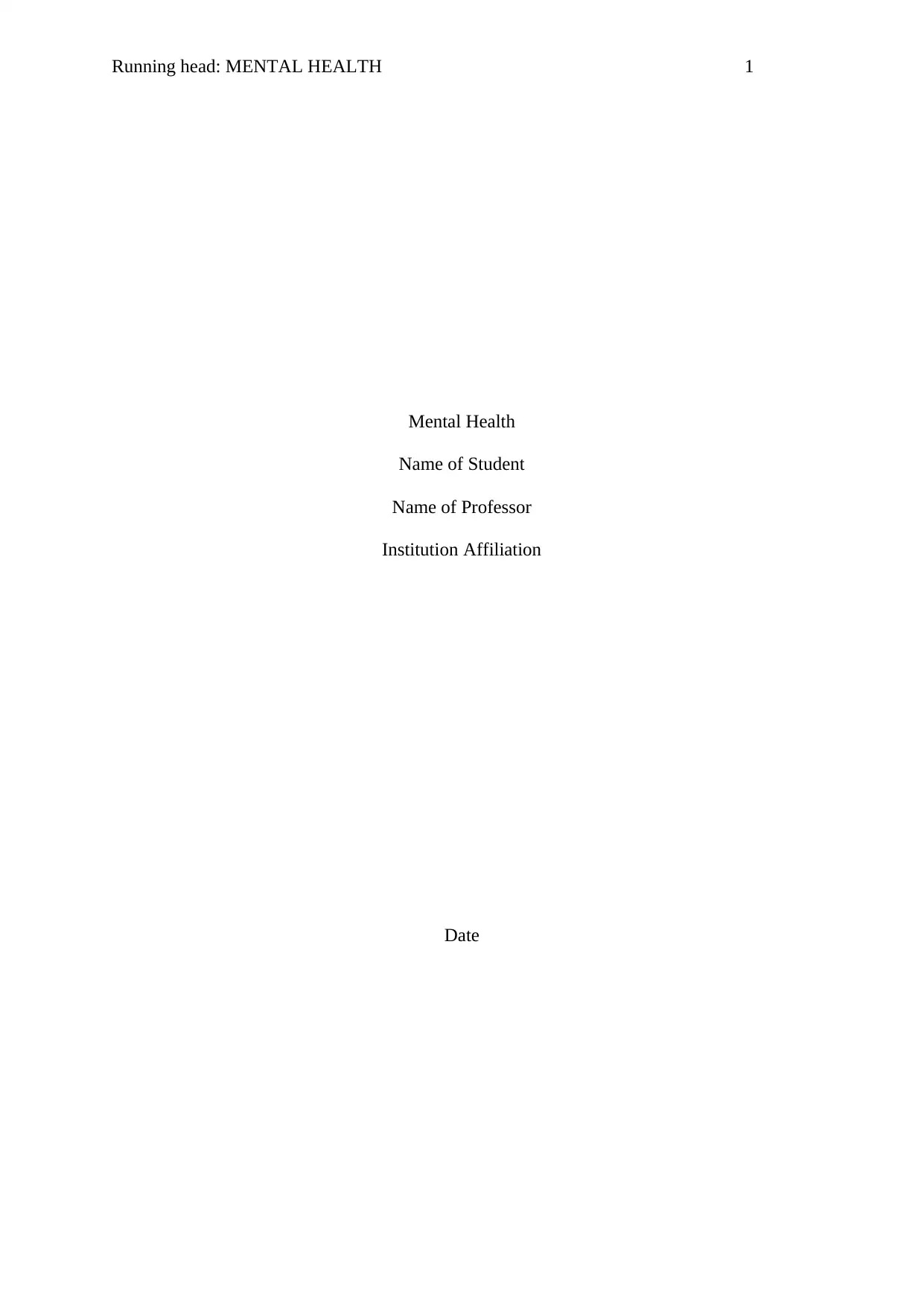
Running head: MENTAL HEALTH 1
Mental Health
Name of Student
Name of Professor
Institution Affiliation
Date
Mental Health
Name of Student
Name of Professor
Institution Affiliation
Date
Paraphrase This Document
Need a fresh take? Get an instant paraphrase of this document with our AI Paraphraser
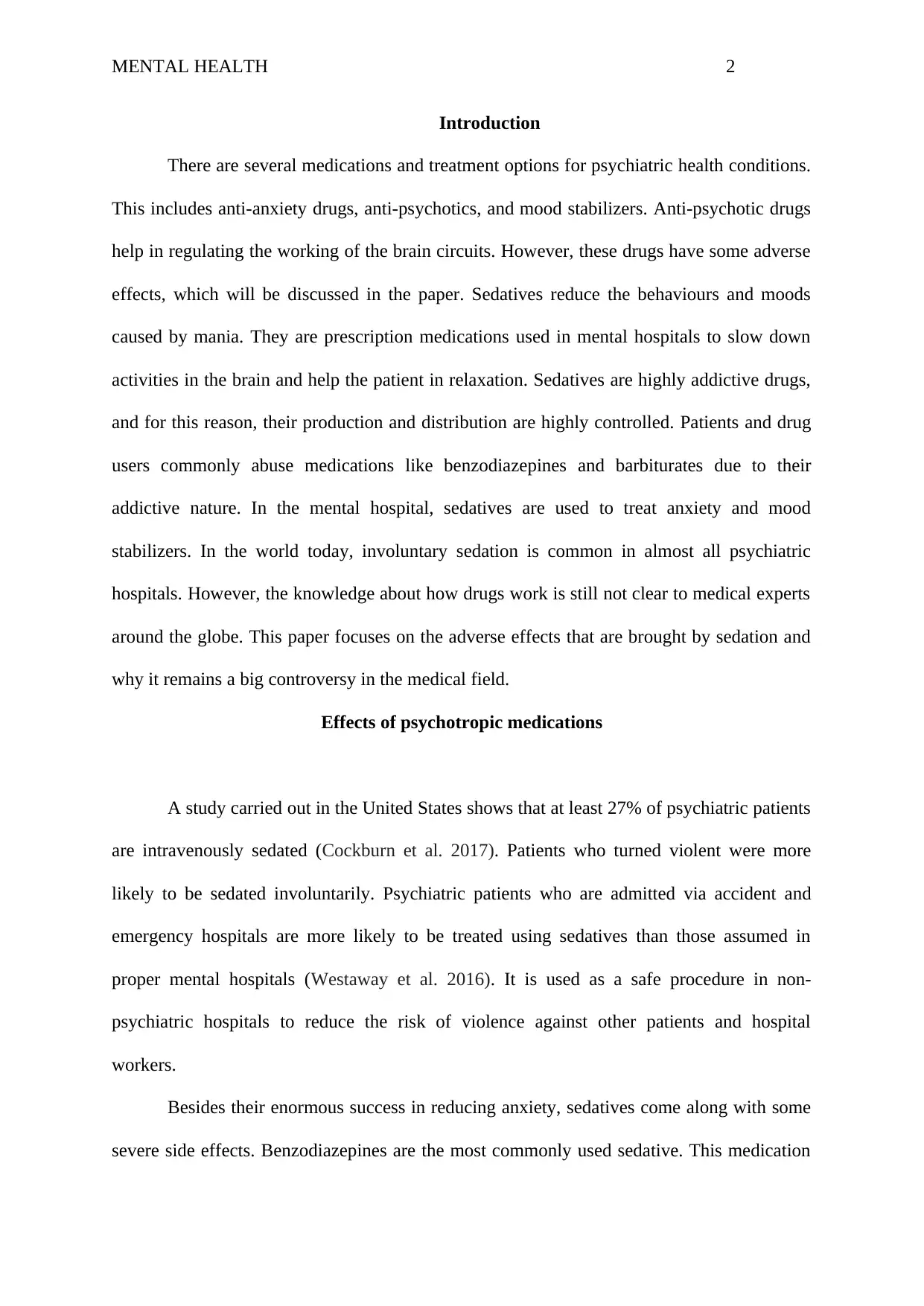
MENTAL HEALTH 2
Introduction
There are several medications and treatment options for psychiatric health conditions.
This includes anti-anxiety drugs, anti-psychotics, and mood stabilizers. Anti-psychotic drugs
help in regulating the working of the brain circuits. However, these drugs have some adverse
effects, which will be discussed in the paper. Sedatives reduce the behaviours and moods
caused by mania. They are prescription medications used in mental hospitals to slow down
activities in the brain and help the patient in relaxation. Sedatives are highly addictive drugs,
and for this reason, their production and distribution are highly controlled. Patients and drug
users commonly abuse medications like benzodiazepines and barbiturates due to their
addictive nature. In the mental hospital, sedatives are used to treat anxiety and mood
stabilizers. In the world today, involuntary sedation is common in almost all psychiatric
hospitals. However, the knowledge about how drugs work is still not clear to medical experts
around the globe. This paper focuses on the adverse effects that are brought by sedation and
why it remains a big controversy in the medical field.
Effects of psychotropic medications
A study carried out in the United States shows that at least 27% of psychiatric patients
are intravenously sedated (Cockburn et al. 2017). Patients who turned violent were more
likely to be sedated involuntarily. Psychiatric patients who are admitted via accident and
emergency hospitals are more likely to be treated using sedatives than those assumed in
proper mental hospitals (Westaway et al. 2016). It is used as a safe procedure in non-
psychiatric hospitals to reduce the risk of violence against other patients and hospital
workers.
Besides their enormous success in reducing anxiety, sedatives come along with some
severe side effects. Benzodiazepines are the most commonly used sedative. This medication
Introduction
There are several medications and treatment options for psychiatric health conditions.
This includes anti-anxiety drugs, anti-psychotics, and mood stabilizers. Anti-psychotic drugs
help in regulating the working of the brain circuits. However, these drugs have some adverse
effects, which will be discussed in the paper. Sedatives reduce the behaviours and moods
caused by mania. They are prescription medications used in mental hospitals to slow down
activities in the brain and help the patient in relaxation. Sedatives are highly addictive drugs,
and for this reason, their production and distribution are highly controlled. Patients and drug
users commonly abuse medications like benzodiazepines and barbiturates due to their
addictive nature. In the mental hospital, sedatives are used to treat anxiety and mood
stabilizers. In the world today, involuntary sedation is common in almost all psychiatric
hospitals. However, the knowledge about how drugs work is still not clear to medical experts
around the globe. This paper focuses on the adverse effects that are brought by sedation and
why it remains a big controversy in the medical field.
Effects of psychotropic medications
A study carried out in the United States shows that at least 27% of psychiatric patients
are intravenously sedated (Cockburn et al. 2017). Patients who turned violent were more
likely to be sedated involuntarily. Psychiatric patients who are admitted via accident and
emergency hospitals are more likely to be treated using sedatives than those assumed in
proper mental hospitals (Westaway et al. 2016). It is used as a safe procedure in non-
psychiatric hospitals to reduce the risk of violence against other patients and hospital
workers.
Besides their enormous success in reducing anxiety, sedatives come along with some
severe side effects. Benzodiazepines are the most commonly used sedative. This medication
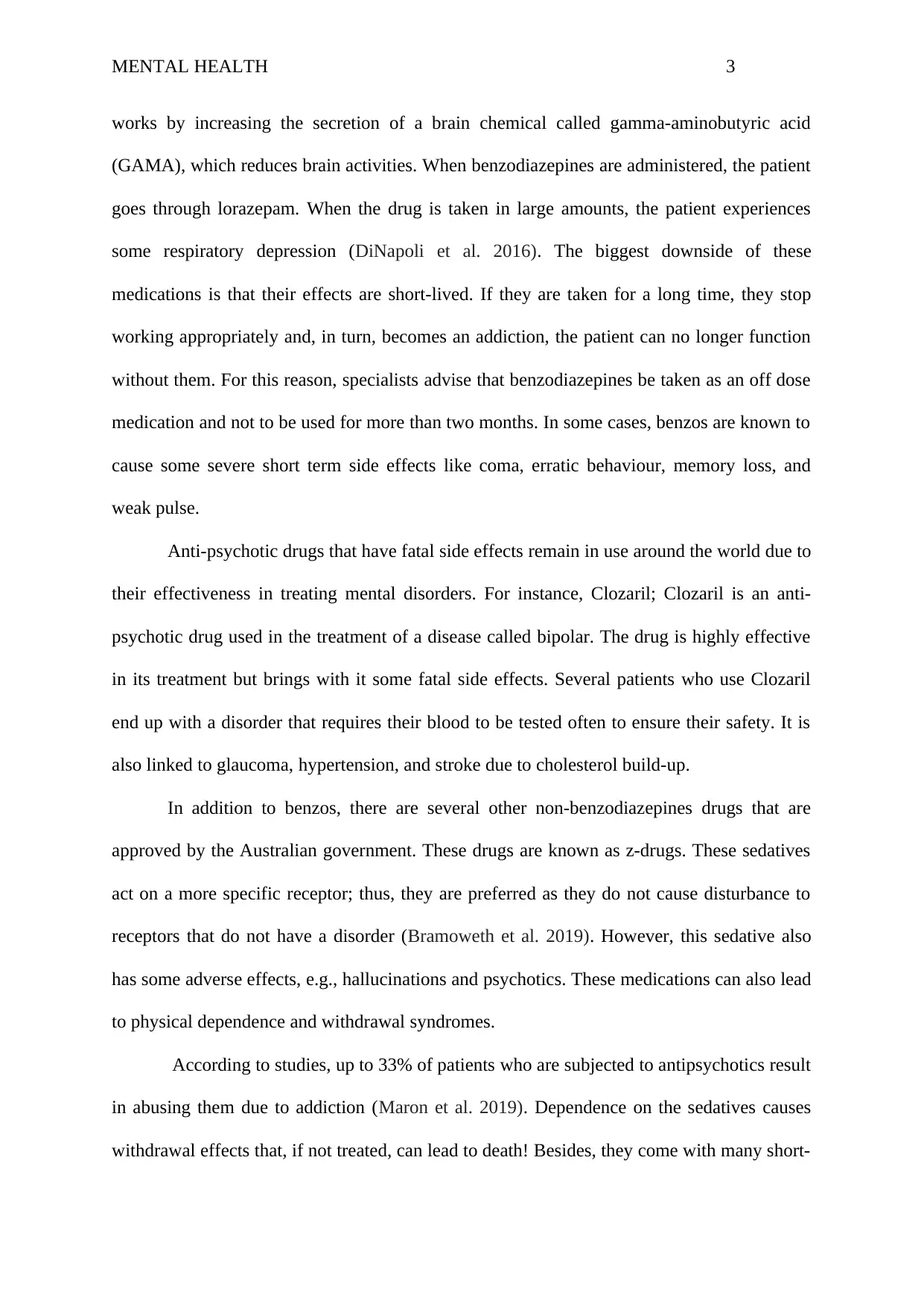
MENTAL HEALTH 3
works by increasing the secretion of a brain chemical called gamma-aminobutyric acid
(GAMA), which reduces brain activities. When benzodiazepines are administered, the patient
goes through lorazepam. When the drug is taken in large amounts, the patient experiences
some respiratory depression (DiNapoli et al. 2016). The biggest downside of these
medications is that their effects are short-lived. If they are taken for a long time, they stop
working appropriately and, in turn, becomes an addiction, the patient can no longer function
without them. For this reason, specialists advise that benzodiazepines be taken as an off dose
medication and not to be used for more than two months. In some cases, benzos are known to
cause some severe short term side effects like coma, erratic behaviour, memory loss, and
weak pulse.
Anti-psychotic drugs that have fatal side effects remain in use around the world due to
their effectiveness in treating mental disorders. For instance, Clozaril; Clozaril is an anti-
psychotic drug used in the treatment of a disease called bipolar. The drug is highly effective
in its treatment but brings with it some fatal side effects. Several patients who use Clozaril
end up with a disorder that requires their blood to be tested often to ensure their safety. It is
also linked to glaucoma, hypertension, and stroke due to cholesterol build-up.
In addition to benzos, there are several other non-benzodiazepines drugs that are
approved by the Australian government. These drugs are known as z-drugs. These sedatives
act on a more specific receptor; thus, they are preferred as they do not cause disturbance to
receptors that do not have a disorder (Bramoweth et al. 2019). However, this sedative also
has some adverse effects, e.g., hallucinations and psychotics. These medications can also lead
to physical dependence and withdrawal syndromes.
According to studies, up to 33% of patients who are subjected to antipsychotics result
in abusing them due to addiction (Maron et al. 2019). Dependence on the sedatives causes
withdrawal effects that, if not treated, can lead to death! Besides, they come with many short-
works by increasing the secretion of a brain chemical called gamma-aminobutyric acid
(GAMA), which reduces brain activities. When benzodiazepines are administered, the patient
goes through lorazepam. When the drug is taken in large amounts, the patient experiences
some respiratory depression (DiNapoli et al. 2016). The biggest downside of these
medications is that their effects are short-lived. If they are taken for a long time, they stop
working appropriately and, in turn, becomes an addiction, the patient can no longer function
without them. For this reason, specialists advise that benzodiazepines be taken as an off dose
medication and not to be used for more than two months. In some cases, benzos are known to
cause some severe short term side effects like coma, erratic behaviour, memory loss, and
weak pulse.
Anti-psychotic drugs that have fatal side effects remain in use around the world due to
their effectiveness in treating mental disorders. For instance, Clozaril; Clozaril is an anti-
psychotic drug used in the treatment of a disease called bipolar. The drug is highly effective
in its treatment but brings with it some fatal side effects. Several patients who use Clozaril
end up with a disorder that requires their blood to be tested often to ensure their safety. It is
also linked to glaucoma, hypertension, and stroke due to cholesterol build-up.
In addition to benzos, there are several other non-benzodiazepines drugs that are
approved by the Australian government. These drugs are known as z-drugs. These sedatives
act on a more specific receptor; thus, they are preferred as they do not cause disturbance to
receptors that do not have a disorder (Bramoweth et al. 2019). However, this sedative also
has some adverse effects, e.g., hallucinations and psychotics. These medications can also lead
to physical dependence and withdrawal syndromes.
According to studies, up to 33% of patients who are subjected to antipsychotics result
in abusing them due to addiction (Maron et al. 2019). Dependence on the sedatives causes
withdrawal effects that, if not treated, can lead to death! Besides, they come with many short-
⊘ This is a preview!⊘
Do you want full access?
Subscribe today to unlock all pages.

Trusted by 1+ million students worldwide
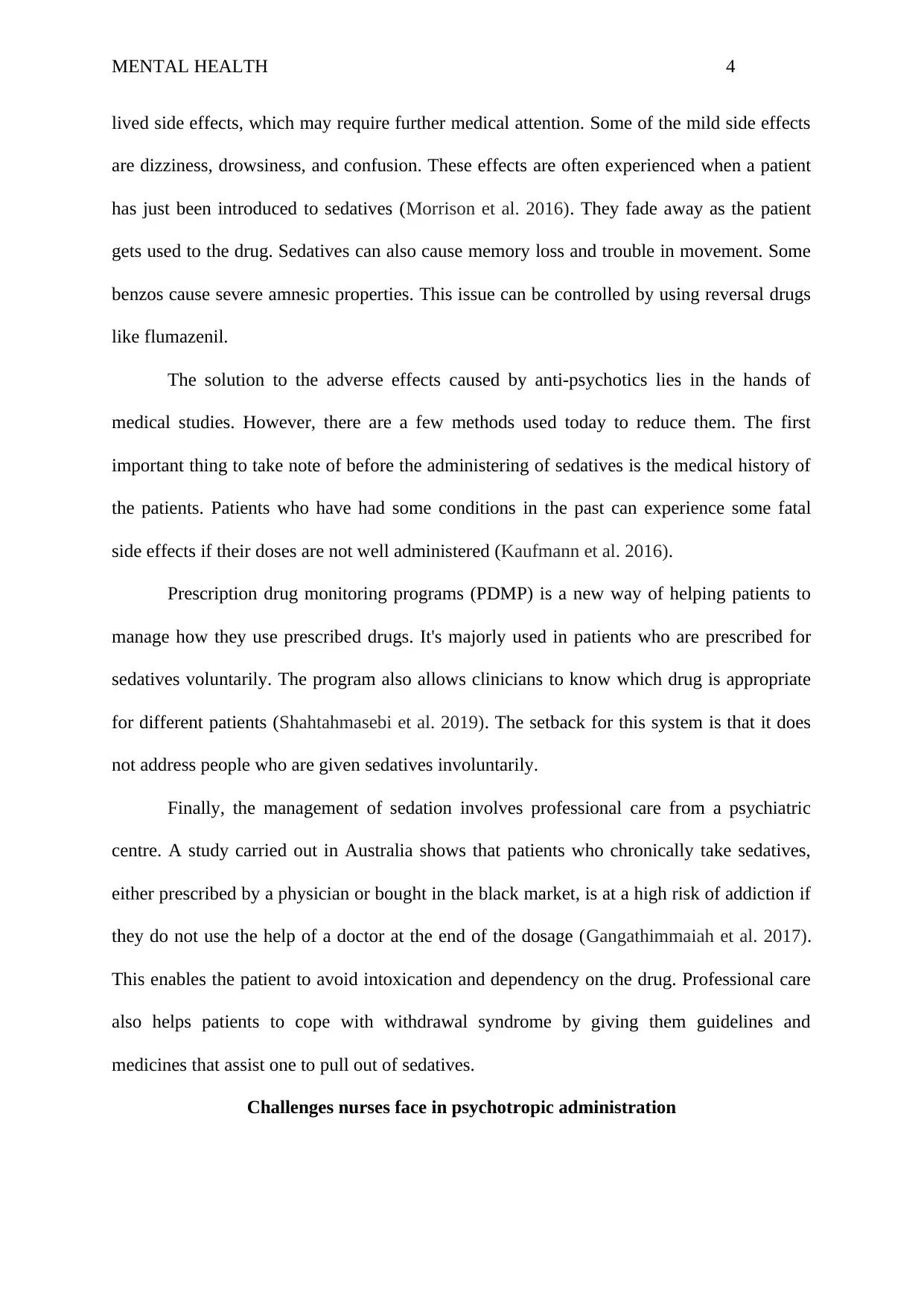
MENTAL HEALTH 4
lived side effects, which may require further medical attention. Some of the mild side effects
are dizziness, drowsiness, and confusion. These effects are often experienced when a patient
has just been introduced to sedatives (Morrison et al. 2016). They fade away as the patient
gets used to the drug. Sedatives can also cause memory loss and trouble in movement. Some
benzos cause severe amnesic properties. This issue can be controlled by using reversal drugs
like flumazenil.
The solution to the adverse effects caused by anti-psychotics lies in the hands of
medical studies. However, there are a few methods used today to reduce them. The first
important thing to take note of before the administering of sedatives is the medical history of
the patients. Patients who have had some conditions in the past can experience some fatal
side effects if their doses are not well administered (Kaufmann et al. 2016).
Prescription drug monitoring programs (PDMP) is a new way of helping patients to
manage how they use prescribed drugs. It's majorly used in patients who are prescribed for
sedatives voluntarily. The program also allows clinicians to know which drug is appropriate
for different patients (Shahtahmasebi et al. 2019). The setback for this system is that it does
not address people who are given sedatives involuntarily.
Finally, the management of sedation involves professional care from a psychiatric
centre. A study carried out in Australia shows that patients who chronically take sedatives,
either prescribed by a physician or bought in the black market, is at a high risk of addiction if
they do not use the help of a doctor at the end of the dosage (Gangathimmaiah et al. 2017).
This enables the patient to avoid intoxication and dependency on the drug. Professional care
also helps patients to cope with withdrawal syndrome by giving them guidelines and
medicines that assist one to pull out of sedatives.
Challenges nurses face in psychotropic administration
lived side effects, which may require further medical attention. Some of the mild side effects
are dizziness, drowsiness, and confusion. These effects are often experienced when a patient
has just been introduced to sedatives (Morrison et al. 2016). They fade away as the patient
gets used to the drug. Sedatives can also cause memory loss and trouble in movement. Some
benzos cause severe amnesic properties. This issue can be controlled by using reversal drugs
like flumazenil.
The solution to the adverse effects caused by anti-psychotics lies in the hands of
medical studies. However, there are a few methods used today to reduce them. The first
important thing to take note of before the administering of sedatives is the medical history of
the patients. Patients who have had some conditions in the past can experience some fatal
side effects if their doses are not well administered (Kaufmann et al. 2016).
Prescription drug monitoring programs (PDMP) is a new way of helping patients to
manage how they use prescribed drugs. It's majorly used in patients who are prescribed for
sedatives voluntarily. The program also allows clinicians to know which drug is appropriate
for different patients (Shahtahmasebi et al. 2019). The setback for this system is that it does
not address people who are given sedatives involuntarily.
Finally, the management of sedation involves professional care from a psychiatric
centre. A study carried out in Australia shows that patients who chronically take sedatives,
either prescribed by a physician or bought in the black market, is at a high risk of addiction if
they do not use the help of a doctor at the end of the dosage (Gangathimmaiah et al. 2017).
This enables the patient to avoid intoxication and dependency on the drug. Professional care
also helps patients to cope with withdrawal syndrome by giving them guidelines and
medicines that assist one to pull out of sedatives.
Challenges nurses face in psychotropic administration
Paraphrase This Document
Need a fresh take? Get an instant paraphrase of this document with our AI Paraphraser
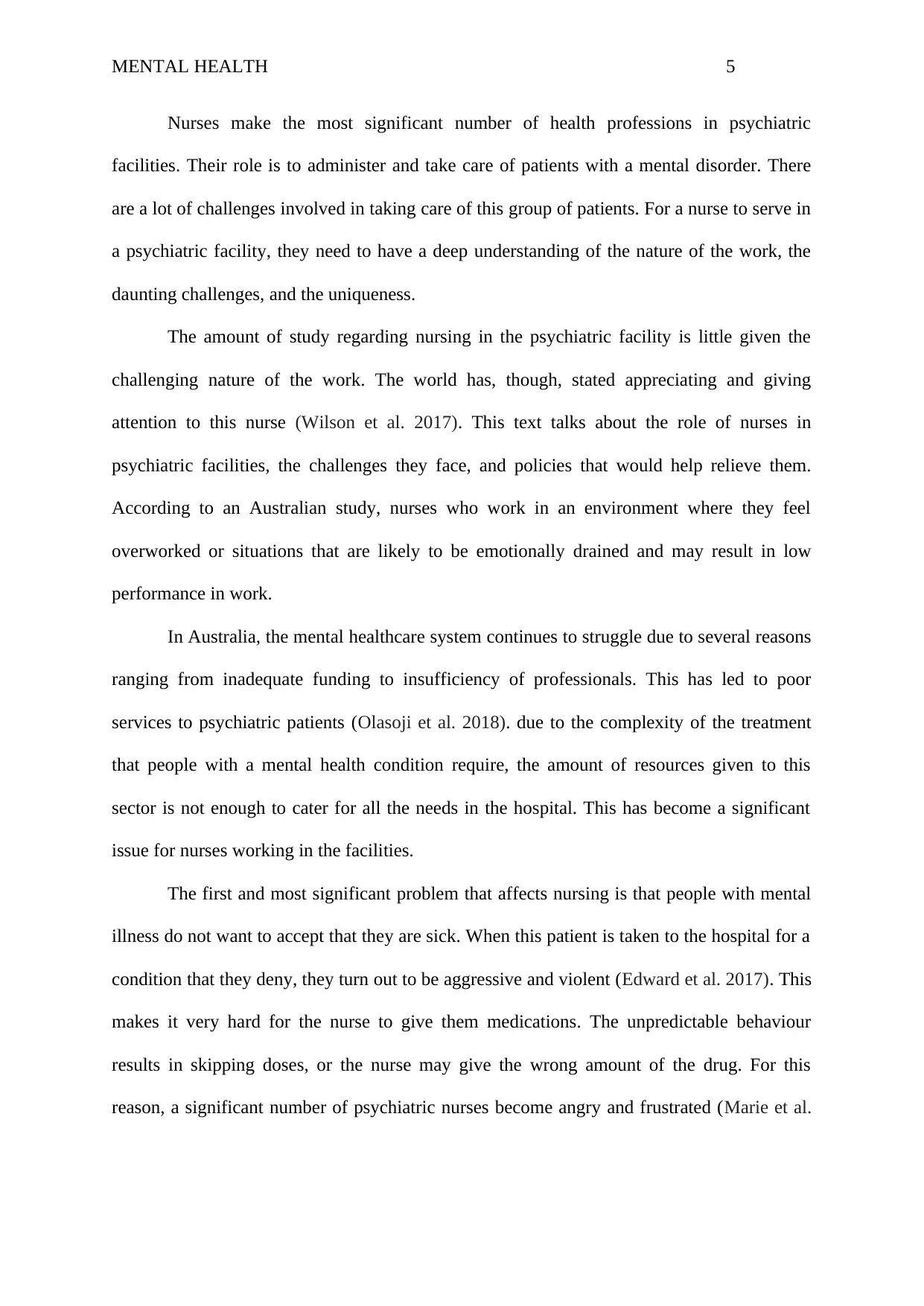
MENTAL HEALTH 5
Nurses make the most significant number of health professions in psychiatric
facilities. Their role is to administer and take care of patients with a mental disorder. There
are a lot of challenges involved in taking care of this group of patients. For a nurse to serve in
a psychiatric facility, they need to have a deep understanding of the nature of the work, the
daunting challenges, and the uniqueness.
The amount of study regarding nursing in the psychiatric facility is little given the
challenging nature of the work. The world has, though, stated appreciating and giving
attention to this nurse (Wilson et al. 2017). This text talks about the role of nurses in
psychiatric facilities, the challenges they face, and policies that would help relieve them.
According to an Australian study, nurses who work in an environment where they feel
overworked or situations that are likely to be emotionally drained and may result in low
performance in work.
In Australia, the mental healthcare system continues to struggle due to several reasons
ranging from inadequate funding to insufficiency of professionals. This has led to poor
services to psychiatric patients (Olasoji et al. 2018). due to the complexity of the treatment
that people with a mental health condition require, the amount of resources given to this
sector is not enough to cater for all the needs in the hospital. This has become a significant
issue for nurses working in the facilities.
The first and most significant problem that affects nursing is that people with mental
illness do not want to accept that they are sick. When this patient is taken to the hospital for a
condition that they deny, they turn out to be aggressive and violent (Edward et al. 2017). This
makes it very hard for the nurse to give them medications. The unpredictable behaviour
results in skipping doses, or the nurse may give the wrong amount of the drug. For this
reason, a significant number of psychiatric nurses become angry and frustrated (Marie et al.
Nurses make the most significant number of health professions in psychiatric
facilities. Their role is to administer and take care of patients with a mental disorder. There
are a lot of challenges involved in taking care of this group of patients. For a nurse to serve in
a psychiatric facility, they need to have a deep understanding of the nature of the work, the
daunting challenges, and the uniqueness.
The amount of study regarding nursing in the psychiatric facility is little given the
challenging nature of the work. The world has, though, stated appreciating and giving
attention to this nurse (Wilson et al. 2017). This text talks about the role of nurses in
psychiatric facilities, the challenges they face, and policies that would help relieve them.
According to an Australian study, nurses who work in an environment where they feel
overworked or situations that are likely to be emotionally drained and may result in low
performance in work.
In Australia, the mental healthcare system continues to struggle due to several reasons
ranging from inadequate funding to insufficiency of professionals. This has led to poor
services to psychiatric patients (Olasoji et al. 2018). due to the complexity of the treatment
that people with a mental health condition require, the amount of resources given to this
sector is not enough to cater for all the needs in the hospital. This has become a significant
issue for nurses working in the facilities.
The first and most significant problem that affects nursing is that people with mental
illness do not want to accept that they are sick. When this patient is taken to the hospital for a
condition that they deny, they turn out to be aggressive and violent (Edward et al. 2017). This
makes it very hard for the nurse to give them medications. The unpredictable behaviour
results in skipping doses, or the nurse may give the wrong amount of the drug. For this
reason, a significant number of psychiatric nurses become angry and frustrated (Marie et al.
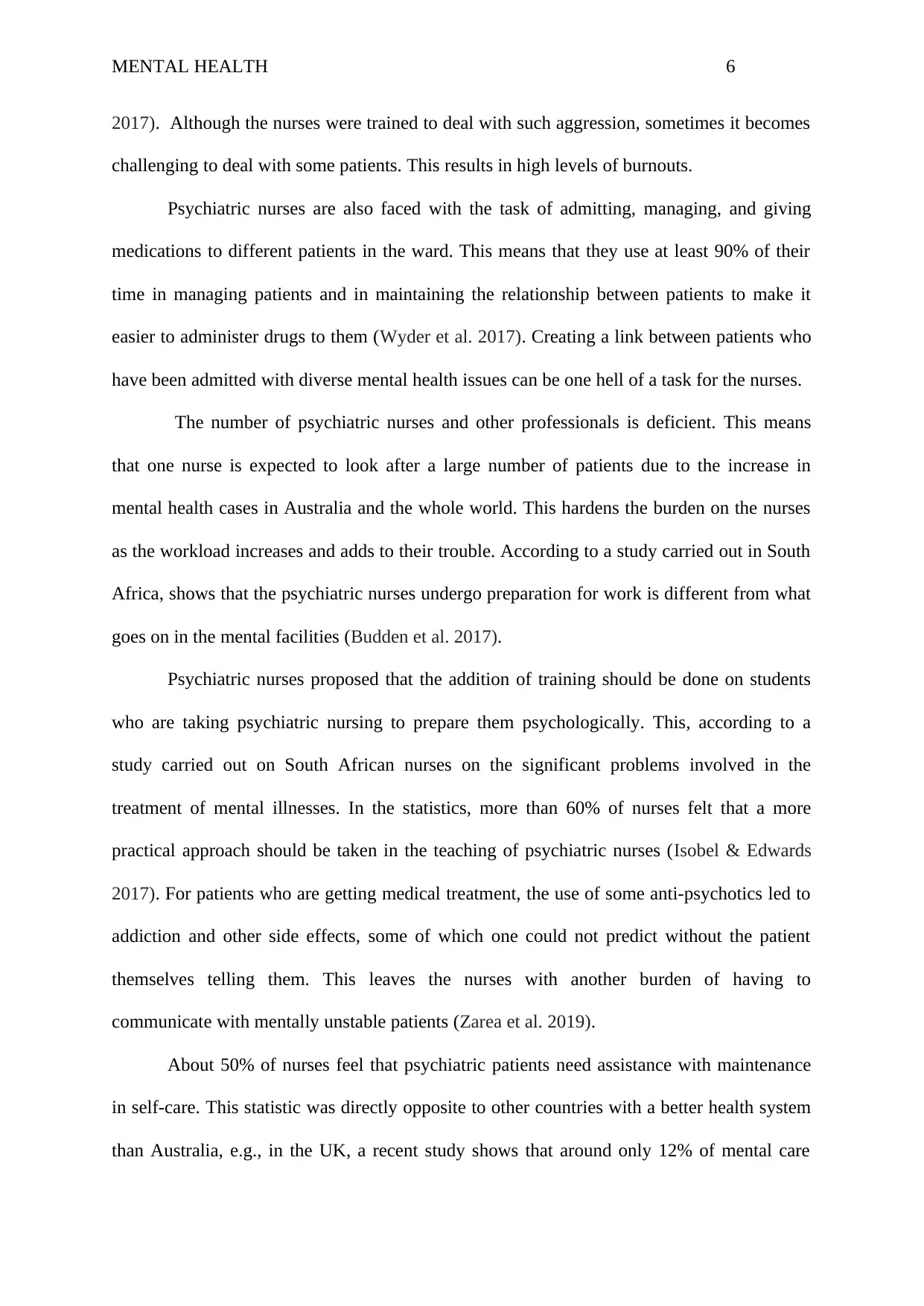
MENTAL HEALTH 6
2017). Although the nurses were trained to deal with such aggression, sometimes it becomes
challenging to deal with some patients. This results in high levels of burnouts.
Psychiatric nurses are also faced with the task of admitting, managing, and giving
medications to different patients in the ward. This means that they use at least 90% of their
time in managing patients and in maintaining the relationship between patients to make it
easier to administer drugs to them (Wyder et al. 2017). Creating a link between patients who
have been admitted with diverse mental health issues can be one hell of a task for the nurses.
The number of psychiatric nurses and other professionals is deficient. This means
that one nurse is expected to look after a large number of patients due to the increase in
mental health cases in Australia and the whole world. This hardens the burden on the nurses
as the workload increases and adds to their trouble. According to a study carried out in South
Africa, shows that the psychiatric nurses undergo preparation for work is different from what
goes on in the mental facilities (Budden et al. 2017).
Psychiatric nurses proposed that the addition of training should be done on students
who are taking psychiatric nursing to prepare them psychologically. This, according to a
study carried out on South African nurses on the significant problems involved in the
treatment of mental illnesses. In the statistics, more than 60% of nurses felt that a more
practical approach should be taken in the teaching of psychiatric nurses (Isobel & Edwards
2017). For patients who are getting medical treatment, the use of some anti-psychotics led to
addiction and other side effects, some of which one could not predict without the patient
themselves telling them. This leaves the nurses with another burden of having to
communicate with mentally unstable patients (Zarea et al. 2019).
About 50% of nurses feel that psychiatric patients need assistance with maintenance
in self-care. This statistic was directly opposite to other countries with a better health system
than Australia, e.g., in the UK, a recent study shows that around only 12% of mental care
2017). Although the nurses were trained to deal with such aggression, sometimes it becomes
challenging to deal with some patients. This results in high levels of burnouts.
Psychiatric nurses are also faced with the task of admitting, managing, and giving
medications to different patients in the ward. This means that they use at least 90% of their
time in managing patients and in maintaining the relationship between patients to make it
easier to administer drugs to them (Wyder et al. 2017). Creating a link between patients who
have been admitted with diverse mental health issues can be one hell of a task for the nurses.
The number of psychiatric nurses and other professionals is deficient. This means
that one nurse is expected to look after a large number of patients due to the increase in
mental health cases in Australia and the whole world. This hardens the burden on the nurses
as the workload increases and adds to their trouble. According to a study carried out in South
Africa, shows that the psychiatric nurses undergo preparation for work is different from what
goes on in the mental facilities (Budden et al. 2017).
Psychiatric nurses proposed that the addition of training should be done on students
who are taking psychiatric nursing to prepare them psychologically. This, according to a
study carried out on South African nurses on the significant problems involved in the
treatment of mental illnesses. In the statistics, more than 60% of nurses felt that a more
practical approach should be taken in the teaching of psychiatric nurses (Isobel & Edwards
2017). For patients who are getting medical treatment, the use of some anti-psychotics led to
addiction and other side effects, some of which one could not predict without the patient
themselves telling them. This leaves the nurses with another burden of having to
communicate with mentally unstable patients (Zarea et al. 2019).
About 50% of nurses feel that psychiatric patients need assistance with maintenance
in self-care. This statistic was directly opposite to other countries with a better health system
than Australia, e.g., in the UK, a recent study shows that around only 12% of mental care
⊘ This is a preview!⊘
Do you want full access?
Subscribe today to unlock all pages.

Trusted by 1+ million students worldwide
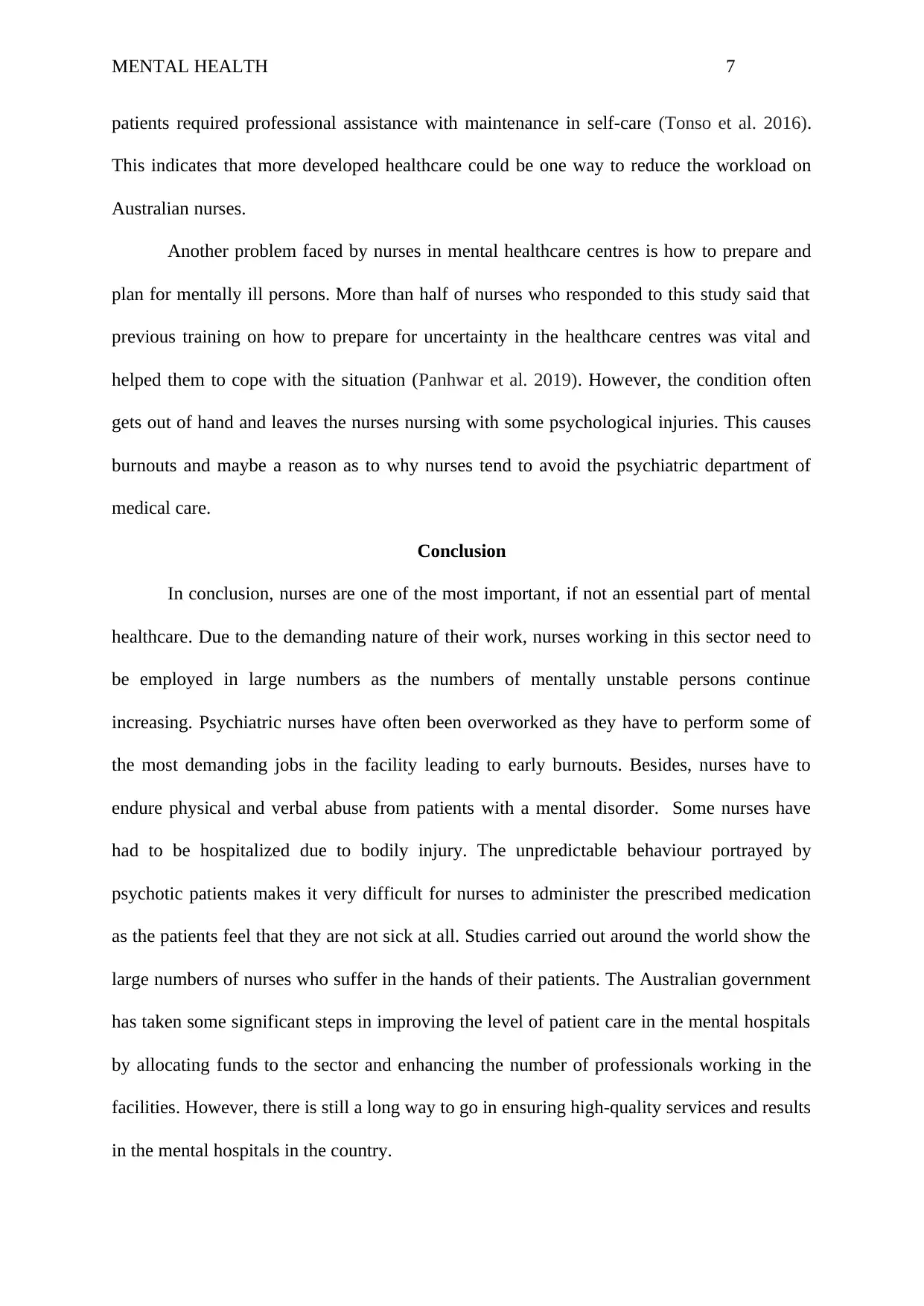
MENTAL HEALTH 7
patients required professional assistance with maintenance in self-care (Tonso et al. 2016).
This indicates that more developed healthcare could be one way to reduce the workload on
Australian nurses.
Another problem faced by nurses in mental healthcare centres is how to prepare and
plan for mentally ill persons. More than half of nurses who responded to this study said that
previous training on how to prepare for uncertainty in the healthcare centres was vital and
helped them to cope with the situation (Panhwar et al. 2019). However, the condition often
gets out of hand and leaves the nurses nursing with some psychological injuries. This causes
burnouts and maybe a reason as to why nurses tend to avoid the psychiatric department of
medical care.
Conclusion
In conclusion, nurses are one of the most important, if not an essential part of mental
healthcare. Due to the demanding nature of their work, nurses working in this sector need to
be employed in large numbers as the numbers of mentally unstable persons continue
increasing. Psychiatric nurses have often been overworked as they have to perform some of
the most demanding jobs in the facility leading to early burnouts. Besides, nurses have to
endure physical and verbal abuse from patients with a mental disorder. Some nurses have
had to be hospitalized due to bodily injury. The unpredictable behaviour portrayed by
psychotic patients makes it very difficult for nurses to administer the prescribed medication
as the patients feel that they are not sick at all. Studies carried out around the world show the
large numbers of nurses who suffer in the hands of their patients. The Australian government
has taken some significant steps in improving the level of patient care in the mental hospitals
by allocating funds to the sector and enhancing the number of professionals working in the
facilities. However, there is still a long way to go in ensuring high-quality services and results
in the mental hospitals in the country.
patients required professional assistance with maintenance in self-care (Tonso et al. 2016).
This indicates that more developed healthcare could be one way to reduce the workload on
Australian nurses.
Another problem faced by nurses in mental healthcare centres is how to prepare and
plan for mentally ill persons. More than half of nurses who responded to this study said that
previous training on how to prepare for uncertainty in the healthcare centres was vital and
helped them to cope with the situation (Panhwar et al. 2019). However, the condition often
gets out of hand and leaves the nurses nursing with some psychological injuries. This causes
burnouts and maybe a reason as to why nurses tend to avoid the psychiatric department of
medical care.
Conclusion
In conclusion, nurses are one of the most important, if not an essential part of mental
healthcare. Due to the demanding nature of their work, nurses working in this sector need to
be employed in large numbers as the numbers of mentally unstable persons continue
increasing. Psychiatric nurses have often been overworked as they have to perform some of
the most demanding jobs in the facility leading to early burnouts. Besides, nurses have to
endure physical and verbal abuse from patients with a mental disorder. Some nurses have
had to be hospitalized due to bodily injury. The unpredictable behaviour portrayed by
psychotic patients makes it very difficult for nurses to administer the prescribed medication
as the patients feel that they are not sick at all. Studies carried out around the world show the
large numbers of nurses who suffer in the hands of their patients. The Australian government
has taken some significant steps in improving the level of patient care in the mental hospitals
by allocating funds to the sector and enhancing the number of professionals working in the
facilities. However, there is still a long way to go in ensuring high-quality services and results
in the mental hospitals in the country.
Paraphrase This Document
Need a fresh take? Get an instant paraphrase of this document with our AI Paraphraser
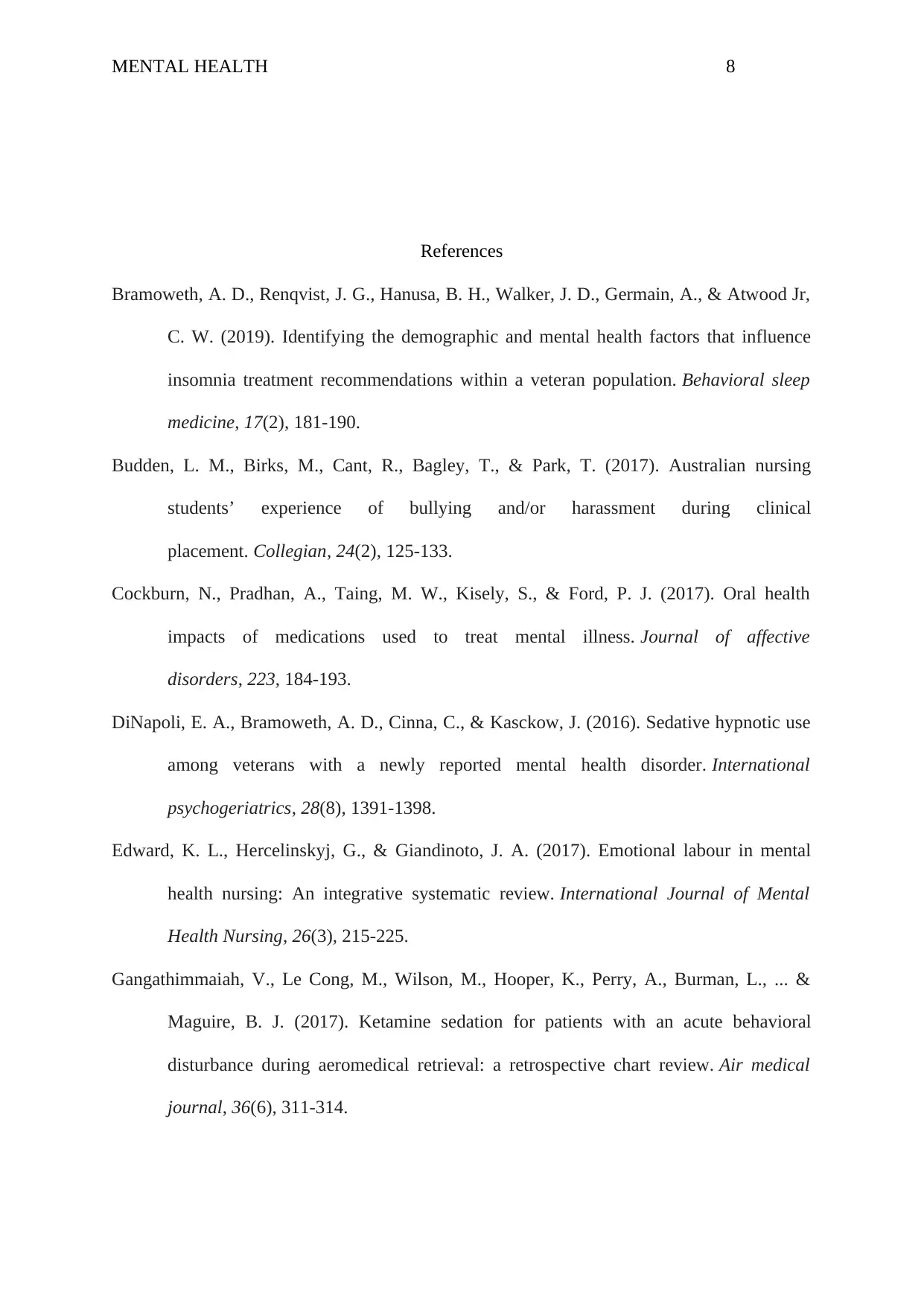
MENTAL HEALTH 8
References
Bramoweth, A. D., Renqvist, J. G., Hanusa, B. H., Walker, J. D., Germain, A., & Atwood Jr,
C. W. (2019). Identifying the demographic and mental health factors that influence
insomnia treatment recommendations within a veteran population. Behavioral sleep
medicine, 17(2), 181-190.
Budden, L. M., Birks, M., Cant, R., Bagley, T., & Park, T. (2017). Australian nursing
students’ experience of bullying and/or harassment during clinical
placement. Collegian, 24(2), 125-133.
Cockburn, N., Pradhan, A., Taing, M. W., Kisely, S., & Ford, P. J. (2017). Oral health
impacts of medications used to treat mental illness. Journal of affective
disorders, 223, 184-193.
DiNapoli, E. A., Bramoweth, A. D., Cinna, C., & Kasckow, J. (2016). Sedative hypnotic use
among veterans with a newly reported mental health disorder. International
psychogeriatrics, 28(8), 1391-1398.
Edward, K. L., Hercelinskyj, G., & Giandinoto, J. A. (2017). Emotional labour in mental
health nursing: An integrative systematic review. International Journal of Mental
Health Nursing, 26(3), 215-225.
Gangathimmaiah, V., Le Cong, M., Wilson, M., Hooper, K., Perry, A., Burman, L., ... &
Maguire, B. J. (2017). Ketamine sedation for patients with an acute behavioral
disturbance during aeromedical retrieval: a retrospective chart review. Air medical
journal, 36(6), 311-314.
References
Bramoweth, A. D., Renqvist, J. G., Hanusa, B. H., Walker, J. D., Germain, A., & Atwood Jr,
C. W. (2019). Identifying the demographic and mental health factors that influence
insomnia treatment recommendations within a veteran population. Behavioral sleep
medicine, 17(2), 181-190.
Budden, L. M., Birks, M., Cant, R., Bagley, T., & Park, T. (2017). Australian nursing
students’ experience of bullying and/or harassment during clinical
placement. Collegian, 24(2), 125-133.
Cockburn, N., Pradhan, A., Taing, M. W., Kisely, S., & Ford, P. J. (2017). Oral health
impacts of medications used to treat mental illness. Journal of affective
disorders, 223, 184-193.
DiNapoli, E. A., Bramoweth, A. D., Cinna, C., & Kasckow, J. (2016). Sedative hypnotic use
among veterans with a newly reported mental health disorder. International
psychogeriatrics, 28(8), 1391-1398.
Edward, K. L., Hercelinskyj, G., & Giandinoto, J. A. (2017). Emotional labour in mental
health nursing: An integrative systematic review. International Journal of Mental
Health Nursing, 26(3), 215-225.
Gangathimmaiah, V., Le Cong, M., Wilson, M., Hooper, K., Perry, A., Burman, L., ... &
Maguire, B. J. (2017). Ketamine sedation for patients with an acute behavioral
disturbance during aeromedical retrieval: a retrospective chart review. Air medical
journal, 36(6), 311-314.
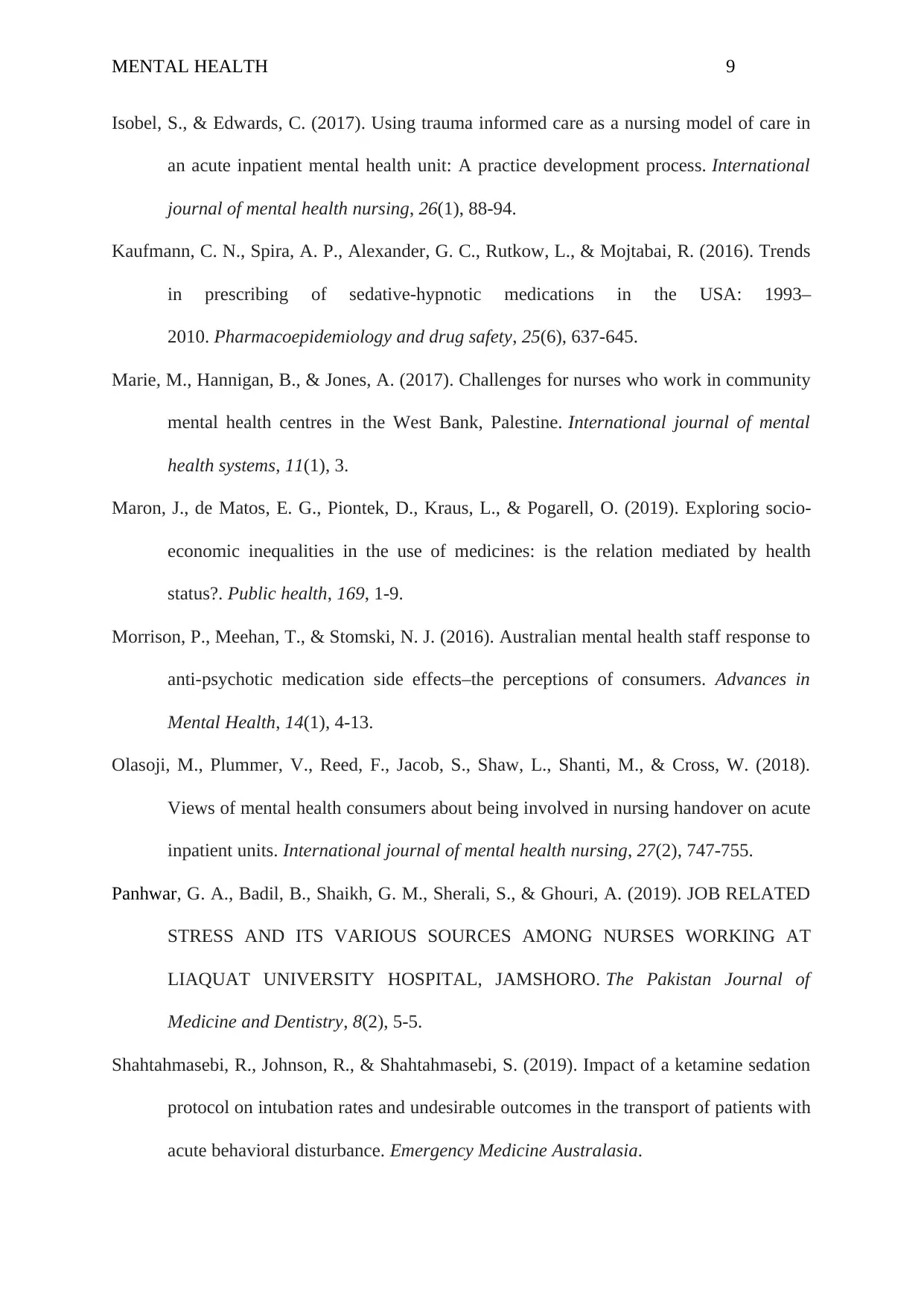
MENTAL HEALTH 9
Isobel, S., & Edwards, C. (2017). Using trauma informed care as a nursing model of care in
an acute inpatient mental health unit: A practice development process. International
journal of mental health nursing, 26(1), 88-94.
Kaufmann, C. N., Spira, A. P., Alexander, G. C., Rutkow, L., & Mojtabai, R. (2016). Trends
in prescribing of sedative‐hypnotic medications in the USA: 1993–
2010. Pharmacoepidemiology and drug safety, 25(6), 637-645.
Marie, M., Hannigan, B., & Jones, A. (2017). Challenges for nurses who work in community
mental health centres in the West Bank, Palestine. International journal of mental
health systems, 11(1), 3.
Maron, J., de Matos, E. G., Piontek, D., Kraus, L., & Pogarell, O. (2019). Exploring socio-
economic inequalities in the use of medicines: is the relation mediated by health
status?. Public health, 169, 1-9.
Morrison, P., Meehan, T., & Stomski, N. J. (2016). Australian mental health staff response to
anti-psychotic medication side effects–the perceptions of consumers. Advances in
Mental Health, 14(1), 4-13.
Olasoji, M., Plummer, V., Reed, F., Jacob, S., Shaw, L., Shanti, M., & Cross, W. (2018).
Views of mental health consumers about being involved in nursing handover on acute
inpatient units. International journal of mental health nursing, 27(2), 747-755.
Panhwar, G. A., Badil, B., Shaikh, G. M., Sherali, S., & Ghouri, A. (2019). JOB RELATED
STRESS AND ITS VARIOUS SOURCES AMONG NURSES WORKING AT
LIAQUAT UNIVERSITY HOSPITAL, JAMSHORO. The Pakistan Journal of
Medicine and Dentistry, 8(2), 5-5.
Shahtahmasebi, R., Johnson, R., & Shahtahmasebi, S. (2019). Impact of a ketamine sedation
protocol on intubation rates and undesirable outcomes in the transport of patients with
acute behavioral disturbance. Emergency Medicine Australasia.
Isobel, S., & Edwards, C. (2017). Using trauma informed care as a nursing model of care in
an acute inpatient mental health unit: A practice development process. International
journal of mental health nursing, 26(1), 88-94.
Kaufmann, C. N., Spira, A. P., Alexander, G. C., Rutkow, L., & Mojtabai, R. (2016). Trends
in prescribing of sedative‐hypnotic medications in the USA: 1993–
2010. Pharmacoepidemiology and drug safety, 25(6), 637-645.
Marie, M., Hannigan, B., & Jones, A. (2017). Challenges for nurses who work in community
mental health centres in the West Bank, Palestine. International journal of mental
health systems, 11(1), 3.
Maron, J., de Matos, E. G., Piontek, D., Kraus, L., & Pogarell, O. (2019). Exploring socio-
economic inequalities in the use of medicines: is the relation mediated by health
status?. Public health, 169, 1-9.
Morrison, P., Meehan, T., & Stomski, N. J. (2016). Australian mental health staff response to
anti-psychotic medication side effects–the perceptions of consumers. Advances in
Mental Health, 14(1), 4-13.
Olasoji, M., Plummer, V., Reed, F., Jacob, S., Shaw, L., Shanti, M., & Cross, W. (2018).
Views of mental health consumers about being involved in nursing handover on acute
inpatient units. International journal of mental health nursing, 27(2), 747-755.
Panhwar, G. A., Badil, B., Shaikh, G. M., Sherali, S., & Ghouri, A. (2019). JOB RELATED
STRESS AND ITS VARIOUS SOURCES AMONG NURSES WORKING AT
LIAQUAT UNIVERSITY HOSPITAL, JAMSHORO. The Pakistan Journal of
Medicine and Dentistry, 8(2), 5-5.
Shahtahmasebi, R., Johnson, R., & Shahtahmasebi, S. (2019). Impact of a ketamine sedation
protocol on intubation rates and undesirable outcomes in the transport of patients with
acute behavioral disturbance. Emergency Medicine Australasia.
⊘ This is a preview!⊘
Do you want full access?
Subscribe today to unlock all pages.

Trusted by 1+ million students worldwide
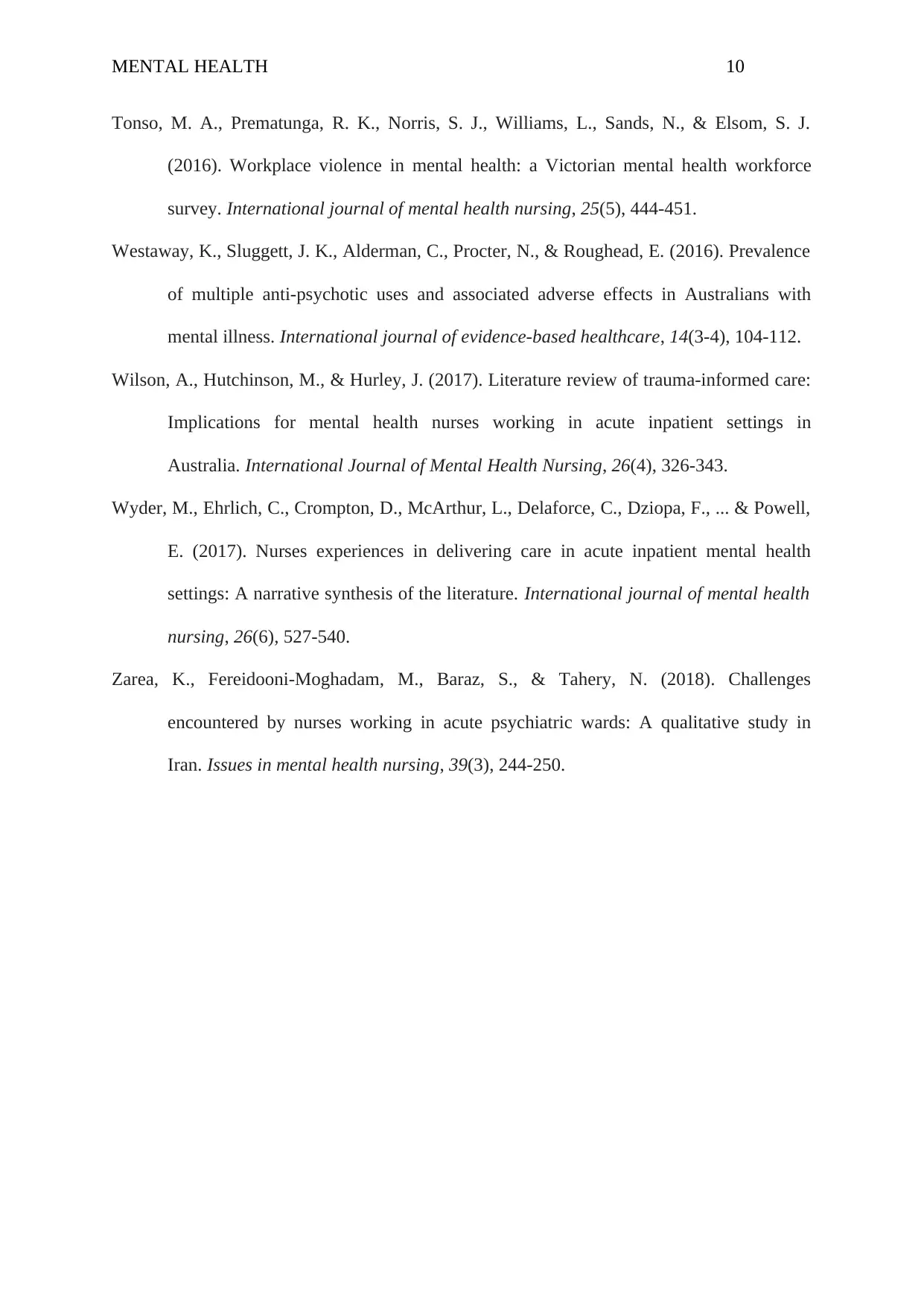
MENTAL HEALTH 10
Tonso, M. A., Prematunga, R. K., Norris, S. J., Williams, L., Sands, N., & Elsom, S. J.
(2016). Workplace violence in mental health: a Victorian mental health workforce
survey. International journal of mental health nursing, 25(5), 444-451.
Westaway, K., Sluggett, J. K., Alderman, C., Procter, N., & Roughead, E. (2016). Prevalence
of multiple anti-psychotic uses and associated adverse effects in Australians with
mental illness. International journal of evidence-based healthcare, 14(3-4), 104-112.
Wilson, A., Hutchinson, M., & Hurley, J. (2017). Literature review of trauma‐informed care:
Implications for mental health nurses working in acute inpatient settings in
Australia. International Journal of Mental Health Nursing, 26(4), 326-343.
Wyder, M., Ehrlich, C., Crompton, D., McArthur, L., Delaforce, C., Dziopa, F., ... & Powell,
E. (2017). Nurses experiences in delivering care in acute inpatient mental health
settings: A narrative synthesis of the literature. International journal of mental health
nursing, 26(6), 527-540.
Zarea, K., Fereidooni-Moghadam, M., Baraz, S., & Tahery, N. (2018). Challenges
encountered by nurses working in acute psychiatric wards: A qualitative study in
Iran. Issues in mental health nursing, 39(3), 244-250.
Tonso, M. A., Prematunga, R. K., Norris, S. J., Williams, L., Sands, N., & Elsom, S. J.
(2016). Workplace violence in mental health: a Victorian mental health workforce
survey. International journal of mental health nursing, 25(5), 444-451.
Westaway, K., Sluggett, J. K., Alderman, C., Procter, N., & Roughead, E. (2016). Prevalence
of multiple anti-psychotic uses and associated adverse effects in Australians with
mental illness. International journal of evidence-based healthcare, 14(3-4), 104-112.
Wilson, A., Hutchinson, M., & Hurley, J. (2017). Literature review of trauma‐informed care:
Implications for mental health nurses working in acute inpatient settings in
Australia. International Journal of Mental Health Nursing, 26(4), 326-343.
Wyder, M., Ehrlich, C., Crompton, D., McArthur, L., Delaforce, C., Dziopa, F., ... & Powell,
E. (2017). Nurses experiences in delivering care in acute inpatient mental health
settings: A narrative synthesis of the literature. International journal of mental health
nursing, 26(6), 527-540.
Zarea, K., Fereidooni-Moghadam, M., Baraz, S., & Tahery, N. (2018). Challenges
encountered by nurses working in acute psychiatric wards: A qualitative study in
Iran. Issues in mental health nursing, 39(3), 244-250.
1 out of 10
Related Documents
Your All-in-One AI-Powered Toolkit for Academic Success.
+13062052269
info@desklib.com
Available 24*7 on WhatsApp / Email
![[object Object]](/_next/static/media/star-bottom.7253800d.svg)
Unlock your academic potential
Copyright © 2020–2026 A2Z Services. All Rights Reserved. Developed and managed by ZUCOL.





